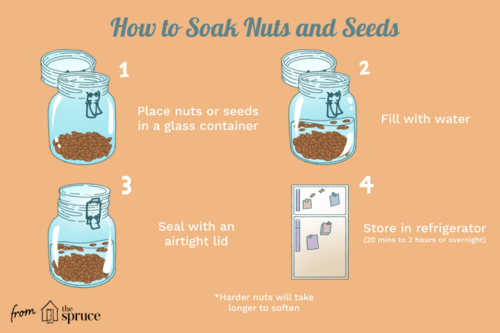

The benefits of soaking. Reduces phytic acids and improves the absorption of important nutrients and minerals, such as protein, iron, zinc and calcium. Reduces tannins and polyphenols.
Soaking has been a method used for centuries by indigenous populations all over the world. Our ancestors may not have known the biochemical reasons for why it was beneficial, but they continued to soak their nuts, seeds, beans and grains to avoid deficiencies and to improve the digestion of these foods.
Soaking is a step taken before cooking beans and grains, an important part of sprouting nuts, seeds, beans and grains, and a practice that's encouraged for those consuming nuts and seeds in their raw form.
There are countless different ways to soak nuts, seeds, beans or grains. The basic steps of soaking include: 1) placing the food, such as beans, in a large bowl or jar, 2) generously covering them with water and 3) leaving them to soak for several hours. There are many benefits to soaking which we'll explore in more detail below.
The benefits of soaking
Reduces phytic acids and improves the absorption of important nutrients and minerals, such as protein, iron, zinc and calcium.
Reduces tannins and polyphenols.
Reduces anti-nutritional enzyme inhibitors.
Removes gas-causing compounds.
Improves texture and decreases cooking time.
1. Reduces phytic acids
Phytic acid, also known as phytate, is a compound commonly found in cereals and grains. Phytic acid is sometimes called an anti-nutrient because it binds to certain proteins and minerals such as iron, zinc, and calcium. By binding to these nutrients, it reduces their ability to be absorbed in our body. Processes that remove or degrade phytic acid have been shown to improve the absorption of proteins and some minerals.
Enzymes are special proteins in our body that speed up reactions, such as digestion. Soaking decreases the phytic acid content of foods in two ways: 1) soaking increases the activity of enzymes called phytases which help breakdown phytic acid, and 2) when soaked, phytic acid molecules leach into the soaking water that's drained and discarded. Overall, the amount of phytic acid decreases as soaking time increases.
2. Reduces tannins and polyphenols
Polyphenols are micronutrients found in a variety of fruits, vegetables, grains, beans, nuts, and some beverages. Tannins are a subclass of polyphenols.
You may have heard of these compounds being in coffee, tea, red wine, and dark chocolate. Polyphenols and tannins are what give these foods their bitter and astringent traits.
Polyphenols have been recognized as the most abundant source of antioxidants in our diet. However, they also bind to positively charged minerals (such as iron) and proteins, making them unavailable for absorption in our bodies. Reducing levels of tannins and polyphenols through soaking helps increase our body's ability to absorb minerals including iron, zinc, and calcium, as well as proteins found in foods such as chickpeas, mung beans, lentils, and peas.
Similar to phytates, soaking serves to reduce polyphenol and tannin concentrations in two ways: 1) soaking activates the enzyme polyphenol oxidase, resulting in the breakdown and loss of polyphenols, and 2) losses may result from these compounds leaching into the soaking medium from the seed coat because they're able to dissolve in water. Significant reductions in the levels of polyphenols and tannins are observed during the first 2 – 4 hours of soaking in water.
3. Reduces anti-nutritional enzyme inhibitors
Leguminous crops such as beans, peas, and lentils contain several anti-nutritional factors. These anti-nutrient factors bind to beneficial enzymes which decreases their activity. We can improve the availability of nutrients present in these foods by removing their anti-nutrient factors (which include trypsin and chymotrypsin inhibitors, proteolytic enzyme inhibitors, oligosaccharides, and lectins). Several studies have recognized the importance of soaking to help discard anti-nutrient compounds in the soaking water.
4. Removes gas-causing compounds
Eating large quantities of beans is known to cause flatulence, or gas, bloating, and farting in humans. We can thank what are called oligosaccharides for this. As humans, we can't break down oligosaccharides because we don't have the protein needed to digest them in our small intestine. As a result, naturally occurring bacteria in our large intestine uses these undigested oligosaccharides. This produces gases and can cause abdominal rumbling, diarrhea and general discomfort in some people. Soaking beans before cooking them has long been shown to reduce the degree of flatulence experienced.
5. Improves texture and decreases cooking time
In addition to the removal of flatulence-causing compounds, the soaking of beans before cooking is a common practice to soften the texture and quicken the cooking process. Soaking for several hours increases the water in the seeds which speeds up chemical reactions, such as starch gelatinization, during cooking.
Summary
The health benefits of consuming nuts, seeds, beans and grains are many. By simply soaking these foods before preparing or eating them, the anti-nutritional properties can be significantly reduced. Lots of literature has demonstrated the varied benefits of soaking, including increased nutrient availability and overall digestibility, as well as quicker cooking times.
Soaking between 2 - 8 hours is recommended, but even a few minutes is better than nothing at all.
Drain and refill the water when soaking uncooked beans and lentils. Discarding the soaking water and re-filling with fresh water one or two times during the soaking period helps to decrease the gas and bloating that may result from eating these foods.
